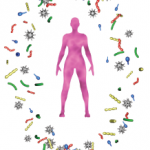Conclusion
This study found that at-risk participants and those with early RA had higher overall IgG anti-Pc-p27 antibody levels and those with established RA had significantly increased IgA anti-Pc-p27 antibody levels. These findings are consistent with, and extend, previous studies. Thus, further investigation into the roles of this and other microorganisms in the evolution and pathogenesis of RA is warranted. Knowledge gained from such studies may lead to the development of therapies to target immunogenic bacterial commensals and/or pathobionts, which may prevent the development of RA in at-risk individuals and may have a beneficial effect in those with new-onset or established RA.
For full study details, including source material, refer to the full article.
Excerpted and adapted from:
Seifert JA, Bemis EA, Ramsden K, et al. Association of antibodies to Prevotella copri in anti-cyclic citrullinated peptide-positive individuals at risk of developing rheumatoid arthritis and in patients with early or established rheumatoid arthritis. Arthritis Rheumatol. 2023 Apr;75(4):507–516.

